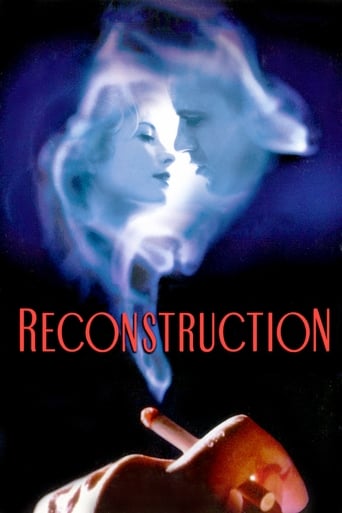

Is this a true, fictional narrative, or is it the figment of the fictional writer's imagination? If that sounds contradictory, then it gives you some inkling about the substance or lack thereof of this most confusing and yet most intriguing film.Is this a film about filming a narrative? Is it a film about two narratives one real fiction, one imaginary fiction? Or, is it simply a film designed to act as a metaphor for the total uncertainty about human relationships? Perhaps, it's all three... or simply an illusion?As it unfolds, we meet a very confused young man, Alex (Nikolaj Lei Kaas) who seems to be in love with the same woman who exists in two different realities and, yet, who co-exist in the same city. On the one hand, Alex is associated with Simone (Maria Bonnevie) definitely and yet, he meets another woman, Aimee (again, Maria Bonnevie), who looks exactly like Simone, in another part of town.Whereas Simone is definitely single, Aimee is apparently married to August, a writer who is in town to give some lectures on the art of writing. At the same time, August is also trying to finish his novel that is a love story, but he's having trouble trying to decide what "the young man" of his story should do and he tells Aimee about his dilemma while they sit in their hotel room.So, while August is discussing the progress of his narrative with his publisher, Monica (Ida Dwinger), young Alex is roaming all over the city trying to understand how it is that both women appear to know him for some of the time, and at other times, he appears to be a stranger to them. Frantically, he rushes from café, to a bar, to a restaurant, to another bar, desperately trying to come to grips with his concept of his reality which, oddly enough, doesn't appear to jive with the reality of anybody that Alex thinks he knows...Totally confused now? Well, you should be, because I think Reconstruction is an experimental film that tries to show just how confusing every person's sense of their own reality must be not only for each person, but to others around them also.You think you really, really know your girlfriend, your wife, your boyfriend, your husband, your lover? This film, I think, forces you to reflect (no pun intended) upon that existential problem, a very real problem for every living person, whether or not we know it. The camera work is also experimental, and some of it is quite original in its construction. You'll know what I mean when you see it that is, if you're prepared to watch it.Definitely not a film for action fans or the 'braindead'.
... View MoreI was having a lot of trouble deciding which of the two women in this film I liked better, the delicate, pale Aimee or the tan, more working-class appearing Simone. Such a dilemma--and one that confronts and confounds protagonist Alex (Nikolaj Lie Kaas). Turns out that it doesn't matter.Yes, trickery--as Danish film maker Christoffer Boe warns us up front with his floating cigarette and magician's hands--is of the essence in this romantic fantasy. What is played with is reality, which of course is what film makers do.For those of you who haven't seen the movie, I recommend that you stop reading here because what follows will likely spoil the movie for you. For those of you who have seen the movie, you might want to see it twice and then read what I have to say.One thing about movies like this is that if you get the "key"--that is, the director's rationale for the way he plays with reality, you more or less get the movie. That's fine and can be enjoyable. If you don't, the movie can be a bit disconcerting and even exasperating.The key here is to realize that it is Aimee's husband August, the novelist, who is the puppeteer. As Vladimir Nabokov liked to remind us, it is the essence of the novelist's art to manipulate the strings. The fact that this story is experienced from Alex's point of view inclines us to look for the key to understanding the film from his point of view. That is the error. Although Alex's persona dominates the film, at the center of the story is August. This is his fantasy and Alex is really just a prop in that fantasy, unable to understand what is happening to him. Indeed Alex--a charming and attractive young man with advanced pick-up skills--is a "gift" from August to his beloved Aimee. It may seem strange to some people that some men so love their wives that they want to give them something that they as the husband never can--that is, an affair with the perfect stranger.The reality of Alex's existence comes from August's pen. In the scenes where Alex finds that his apartment has disappeared, that people don't know him (even his father doesn't know him), that Aimee/Simone think they are seeing him for the first time, the logic is this: what has happened before has been erased and rewritten, that is, reconstructed. Only poor Alex doesn't know since he is just a character in the story.This reminds me a bit of Vanilla Sky (2001) and Abre los ojos (1997) in which the central character is a protagonist in a larger reality controlled by a software program. Here the control is in the hands of the novelist. Note well who gets the girl as the film ends: the guy who wrote the story, the guy who arranged to be giving lectures so that his wife could meet Alex and spend some time with him. Remember too in the scene where August comes back to the hotel room a bit too soon while Aimee is in the shower, and discovers tell-tale signs of Alex's presence. What does he do? He quickly leaves and returns a few minutes later after she has had time to straighten up.In the final analysis, a patriarchal view of love in inexorably wrapped up in control. The patriarchal lover (the husband, August) wants to control his beloved. In this stylish and attractive fantasy, he even controls her reality.(Note: Over 500 of my movie reviews are now available in my book "Cut to the Chaise Lounge or I Can't Believe I Swallowed the Remote!" Get it at Amazon!)
... View MoreThis film will not appeal to the average person and, I suppose, it never was intended for a mass audience. Instead, it appears to be an experimental-type film that challenges the viewer to find their own meaning, if any, from the film. The movie seems to have no real start or finish and bounces back and forth in time. Additionally, reality is often twisted and people in the movie who you saw interacting with the lead character suddenly have no idea who he is and claim to have never met him. If the film had maintained this viewpoint, it would have been very reminiscent of the TV show NOWHERE MAN, but it did not. Again, inexplicably, characters who seemed to have forgotten who he was suddenly know who he is once again.The film looks as if the writer took many versions of the same story and spliced them all together with no regard to WHEN and HOW the splices were pieced together. This is certainly NOT the type film I enjoy, though I did appreciate that they were trying to do something different.
... View More"Reconstruction" is a clever, European take on "Unfaithful" where an older husband uses literary intellect instead of violence to attempt "The Revenge of the Cuckold." But we have no idea how much is real or imagined or roman a clef or the character of the author is identifying too much with his alter ego, as we are told from the outset that what we will be seeing is the magic of the storyteller or puppeteer, watching as he manipulates his characters, trying out different situations in different drafts of a novel, erasing and playing out different scenarios of chance and choice, where art replaces the memory science of "Code 46." I don't think I was the only audience member, however, who was rooting instead for the tall, dark, handsome young man as Nikolaj Lie Kaas has captivating chemistry with Maria Bonnevie (and I feel really foolish that I couldn't tell from either the film or the Danish credits until I looked at the IMDb listing that she plays both the jilted girlfriend and the adulterous wife). The author makes some lame justifications about women needing love and men accidentally falling into it, or some such, that doesn't quite make sense and the film is supposed to be illustrating the point that a man has to learn about hurt as a price to be able to love. The author's self-understanding I suppose is illustrated by him reading his book's dedication to his wife in a desperate plea for her to forgive him all his inattention, etc. as he needs her for his art, so she shouldn't look for passion elsewhere. But we're left more with the very powerful visuals of the different versions of how he imagined her possible affair could have started (a la "Brief Encounter") and its ramifications or concluded, and the feeling that the older guy was a smug deus ex machina. In the things one can learn from the movies department: we also get a nice tour of Copenhagen-- people can smoke anywhere, even on the subway, and do, constantly; restaurant bathrooms have real terry cloth towels; the Hilton is really luxurious; Danes and Swedes don't seem to exchange cell hone numbers; and, like in "Italian for Beginners," Danes seem to think of Italy as the place to go for romance.
... View More